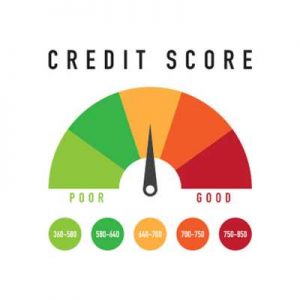 Some people think I’m too much of a fanatic about keeping credit scores high, (or getting them up there), but I know what a huge difference a great credit score can make in your day-to-day existence.
Some people think I’m too much of a fanatic about keeping credit scores high, (or getting them up there), but I know what a huge difference a great credit score can make in your day-to-day existence.
- If you buy or lease a vehicle, the total interest you pay varies by many thousands of dollars.
- If you finance a home, it can mean tens or hundreds of thousands of dollars over the life of a loan.
- Revolving debt and installment debt interest rates will be affected.
I’m not advocating that you purchase on credit – cash is usually best unless it’s strategic debt. There are times, however, when you won’t have a choice, so here are five tips to keep your credit score maximized.
Tip #1 – Your Balances
The single most impactful thing you can do to maximize your score is to use your credit, but not too much. And the bureaus don’t care if you pay your cards in full every month, or not. If you don’t use your credit, you get dinged. If you use your credit too much, you get dinged.
The best practice is to keep your balances between 20%-30% of your credit limit and always pay at least the minimum payment. You can pay more of course, but as long as you keep your balance low it doesn’t really matter, at least where your score is concerned. Of course, the total amount you will pay in interest if you just make minimum payments is significant, but for purposes of your credit score, it doesn’t matter as long as your balance is low.
My personal experience is that when I was hospitalized for 3+ months and ran my cards to the limit, my score went from the high 700’s to the mid 500’s, overnight! I was horrified, but this just shows how much balances vs limits affect the score. Experian says it’s weighted to be 30% of your score, but I don’t believe it. I had no late payments and no public records (liens, bankruptcies, etc). So, it looks like balances contribute a lot more than 30%. (You can’t trust everything you read – including the credit
Summary #1. Keep those balances low, but use your cards.
Tip #2 – Your Available Credit
Frequently my clients have applied for new credit cards just to increase their available credit. This is not a good strategy. If you already have two or three cards, that is optimal. Better to call your current credit card companies and request increased limits. Based on your payment history and the length of time you’ve been a customer, increased limits aren’t hard to get.
Summary #2. Request increases in your current card limits, do not apply for new credit and don’t close cards you already have, even if you aren’t using them.
Tip #3 – Revolving Debt vs Installment Debt
I’m often asked what has more impact on a credit report, credit card debt or installment debt.
Credit card debt is considered “revolving” since it continues without a definite end date the balance can both increase and decrease continually.
Installment debt is anything that has a beginning and an end, such as a vehicle loan, student loan or a loan for a new refrigerator. It begins with a balance and is paid down to 0 over time. Because of this, as long as the payments are made on time, the balances will continuously drop and will have a positive impact on your credit.
If you don’t have a lengthy credit history, do not open a lot of new accounts too rapidly. The reason behind this is that the age of your accounts is determined by an average. If you open several new cards, the average age will lower. Length of credit history is important.
Summary #3. Only open new credit if you don’t have at least 3 active credit accounts.
Tip #4 – Credit Inquiries – Myths and Facts
Credit inquiries is another much-misunderstood category. If you are car shopping, for example, every time you set foot on a car lot, they will run your credit, even without your express permission. (Yeah, illegal but . . .)
Same with a new mortgage, except reputable companies won’t run your credit without your written permission.
In either case, best to group the inquiries – in other words, do your car shopping within a focused period of time. If you have 10 inquiries from 10 different car lots, it won’t have a devastating effect on your credit as the bureaus will understand that you aren’t buying multiple vehicles, you are just shopping. This is a relatively new algorithm of the bureaus as it used to really hurt consumer’s scores.
When shopping for a mortgage, the same thing applies but there is a twist. You don’t always know how many companies are running your credit. For example, you may decide to go to Lending Tree to shop for rates. They get your permission to run your credit. What you may not realize is that they are not a lender nor a broker. They are a third-party service who will simply shop your information to multiple banks and brokers. Each of these will run your credit based on the permission you gave Lending Tree. Unbeknownst to you, many lending sources will show up as inquiries on your credit. This can have a serious effect if they aren’t all done with the same focused period, and they are all too often spread out over time.
Summary #4 – Always know who, and when your credit report is being run.
Tip #5 – If You Have Poor Credit, What Can You Do?
If you currently have poor credit all you can do it take it one step at a time. Experian says 35% of your score is your payment history so if you have late payments being reported, all you can do from here on is start paying everything on time. The older a late payment is, the less impact it has on your credit score. Also, it’s important to know that while late payments in your past lower your score, paying on time from here on will add weight toward the positive side of the algorithm.
You can hire a credit repair company to help get those old late payments removed, or you can call the creditors yourself and ask them to remove the negative history. Whichever way you decide to go, it will take time.
Summary #5 – No matter your credit history, going forward, make all payments on time.
To sum up: Two or three active credit cards with balances below 30% of credit limits, a vehicle or other installment loan (or lease) and possibly a mortgage. This is the general snapshot of a successful credit report. Open accounts with 0 balances are fine. Just leave them be.
There are many other small factors, but these 5 factors will have the most impact. If you need help with any of this, get in touch.


Leave a Reply